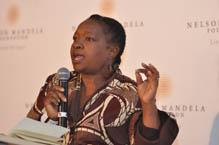
Nelson Mandela Children’s Fund CEO Sibongile Mkhabela speaking at the third annual Malibongwe Dialogue
August 27, 2009 – Sibongile Mkhabela, CEO of the Nelson Mandela Children’s Fund, said today that the most important thing that needed to come out of the Nelson Mandela Foundation’s Malibongwe Dialogue was to take the discussion into communities.
She was speaking at the third Malibongwe Dialogue, held at the Turbine Hall in Johannesburg on the theme of women’s economic development and poverty eradication.
“Today we’re going to get real,” she said. “We’re going to look at the problems in the face. I don’t want to take the platform today as the CEO; I want to take it as a woman.
“When I go home, I speak to people in the communities, particularly the women, and I am saddened by how little they know about these dialogues. When I go home I know that the new generations are poorer than those before them, but I go back and I look at the policies and they tell a different story.”
In explaining why this disparity between policy and reality existed, Mkhabela argued that the unification that had benefited South Africans and particularly South African women during the struggle against apartheid no longer existed.
“What made the struggle work was that we were all in the same struggle; we weren’t talking about ‘them’, we were talking about ‘us’. Until these conversations stop being about ‘them’ and become about ‘us’, it’s going to be futile,” Mkhabela said.
She highlighted the fact that when there were incidents of social upheaval in South Africa, it was women who were the most at risk.
“When taxi drivers threaten violence because of the proposed implementation of the Bus Rapid Transit system, it’s women who are most at risk and yet the ones we are the least likely to hear from,” she said.
Mkhabela argued that in order to find sustainable solutions to poverty in those areas which were most affected by it, money needed to be kept within those areas. In the current system, she said, those people who earned money too often went outside their area to spend it, which perpetuated the poverty.
She said there were a number of questions that the women of South Africa needed to answer: “What is our vision as women? What is it I want for the women at home?”
She also talked of the need for better inter-generational dialogue amongst women. “We need to take lessons from those before us and the younger women whose levels of tolerance are lower than ours, in order to find a solution. We need to get involved, we need to go back into our communities and speak to the women there and plant the seeds.
“We should not be looking at a pile of reports in 20 years, we should be looking at the quality of life the women have in those communities that we’ve reached out to. … I saw my mother take six children through university. Don’t say it can’t be done; it can be done.”
Mkhabela concluded by noting that “Even if women are empowered and educated they must be silent. How are we going to address these issues if we’re going to keep putting these invisible masks around the mouths of young women?”


